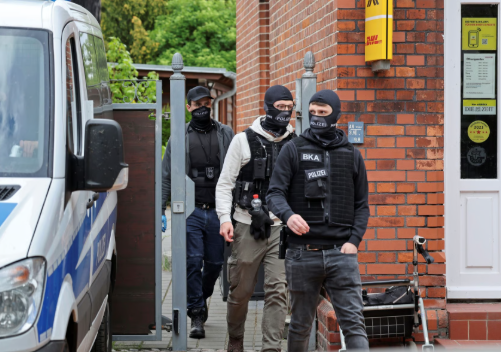In a significant crackdown on far-right extremism, German authorities have arrested five teenagers, aged between 14 and 18, suspected of being members of a neo-Nazi group called “Letzte Verteidigungswelle” (“Last Wave of Defense”). The arrests were made during coordinated raids across the states of Brandenburg, Mecklenburg-Vorpommern, Hesse, and Thuringia. The group is accused of planning and executing violent attacks targeting migrants and left-wing political figures, aiming to destabilize Germany’s democratic order through acts of terrorism.
The suspects face serious charges, including membership in a domestic terrorist organization, attempted murder, and aggravated arson. Specific incidents linked to the group include a fire set at a cultural center in Altdöbern and a failed arson attempt at an asylum-seeker home in Schmölln. Authorities are also investigating three additional individuals, aged 18 to 21, who are already in custody for related offenses.
The group’s operations were primarily organized through closed WhatsApp groups, with approximately 200 participants nationwide. Prospective members were reportedly required to provide evidence of criminal acts, such as assaults on migrants or acts of vandalism, to gain entry. The group’s communications glorified National Socialism and propagated violence, including so-called “pedophile hunting” and doxing of individuals.
Justice Minister Stefanie Hubig expressed alarm over the youth of the perpetrators, highlighting the concerning trend of radicalization among minors. She emphasized the need for increased vigilance and preventive measures to combat the spread of right-wing extremism among young people.
These arrests come amid a broader surge in right-wing violence in Germany. In 2024, authorities recorded a 17% increase in right-wing extremist crimes, totaling 33,963 reported offenses, including 1,136 violent attacks. Attacks on refugees have also escalated, with 2,378 incidents reported in 2023, up from 1,248 in 2022.
The rise in far-right activities has prompted calls for comprehensive strategies to address the root causes of radicalization. Experts advocate for enhanced educational programs, community engagement initiatives, and stricter monitoring of online platforms where extremist ideologies are propagated. The German government continues to prioritize efforts to safeguard democratic values and protect vulnerable communities from hate-fueled violence.
The alarming rise in far-right activities across Germany—marked by a surge in hate crimes, violent attacks on asylum seekers, and the radicalization of minors—has intensified public and political pressure on authorities to adopt a more comprehensive, multi-pronged strategy to combat extremism at its roots. Experts agree that repression alone is insufficient; sustainable solutions must involve early intervention and the cultivation of social resilience against hate ideologies.
Educational reform is widely seen as a critical pillar in the fight against radicalization. Schools are being urged to implement stronger civic education curricula that emphasize democratic values, human rights, and critical thinking. By equipping students with the tools to identify propaganda and resist extremist narratives, educators can help build a generation that is less susceptible to the allure of hate-based ideologies. Additionally, experts recommend training teachers to spot early signs of radical behavior and offer constructive guidance or referrals to support systems.
Keep Reading QuestEuro.com for more news and analysis.

More Stories
How India’s Outreach Drive Could Influence Europe-India Trade Dynamics
How Europe’s Trade Landscape Could Shift Following India-UK CETA Outreach
Why Cultural Diplomacy in Europe Is Gaining Momentum Amid Global Shifts